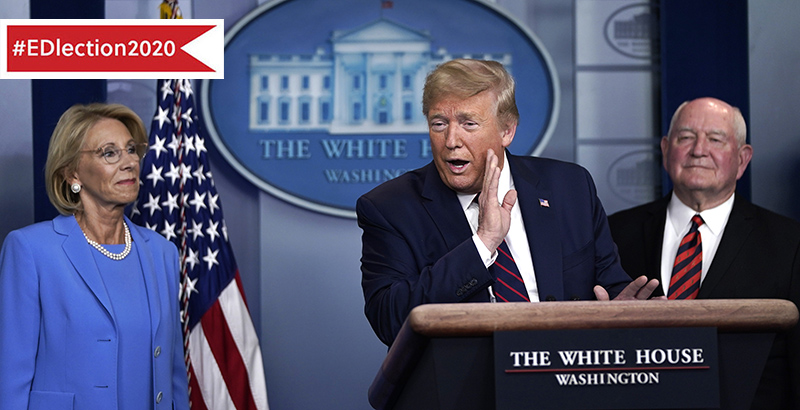Majority of Americans Give Trump a Failing Grade on Education Policy Ahead of Re-election Bid, PDK Poll Finds

As President Donald Trump makes his case for re-election and the nation confronts a school system in disarray, the results of a new poll taken in the early days of the pandemic show a majority of Americans giving him a failing grade on key education issues.
While 53 percent of Americans disapprove of Trump’s performance on education policy, there’s a clear partisan divide between Republicans and Democrats, according to the national public opinion poll, which was released on Tuesday by PDK International, a professional association for educators. While 86 percent of Republicans approve of Trump’s education performance, just 11 percent of Democrats agreed. Nearly half of independents gave a nod of approval to Trump, who accepted the GOP’s nomination for a second term on Monday on the first day of the Republican National Convention.
In the fourth year of their first terms, disapproval ratings were less stark for former presidents Barack Obama and George W. Bush. In a Gallup poll at the time, 43 percent of voters disapproved of Obama’s education performance; 45 percent said the same of Bush in a similar ABC News/Washington Post poll.
But this year’s PDK poll, the 52nd annual iteration, comes with a major caveat: It was conducted in March 2020, just as the pandemic began to close schools nationwide. The findings suggest a subtle shift in Americans’ opinions on education policies — rather than a sudden, pandemic-induced shock. But Joshua Starr, PDK’s CEO, predicted that Trump’s approval rating on education has only deteriorated since schools shuttered in the spring and people saw “what a disastrous response to COVID has meant for public schools.” As the new academic year begins, the Trump administration has pushed districts to reopen campuses for in-person learning while some parents and many teachers unions have challenged the safety of such a move.
“One thing we’re seeing at the local level is, the absence of a national strategy for COVID mitigation, testing, etc., has resulted in schools not being able to open physically,” Starr told The 74. “That could have been avoided and is something that people — rightfully so — lay at the president’s feet.”
Even before the pandemic, 6 in 10 respondents — and 7 in 10 parents — said public education plays an important role in how they plan to vote come November. Among Black respondents, 79 percent said the president’s performance on education is key to their vote, as did 71 percent of Latinos. Just 52 percent of white voters agreed.
Starr was skeptical that many voters will cast their ballots based primarily on the candidates’ education platforms because the issue “never looms that large in national elections,” yet he acknowledged that the partisan battle over school closures and the pandemic could generate a sense of heightened urgency.
A nationally representative sample of 1,030 adults, including more than 200 parents with school-age children, participated in PDK’s online survey. Digging deeper into the nuts and bolts, a whopping 85 percent said the federal government should place a greater emphasis on attracting and retaining quality teachers, and 77 percent wanted to see more effort on making college more affordable.
The survey was also conducted before George Floyd, a Black man, died at the hands of a Minneapolis police officer in May, igniting a fresh wave of Black Lives Matter protests across the country. Still, more than two-thirds of respondents said they favor a greater federal focus on protecting students from discrimination in school. While 90 percent of Black and 77 percent of Latino respondents favored a greater emphasis on combating discrimination, just 62 percent of whites agreed. Among Democrats, 85 percent favored greater attention being paid to discrimination, as did about half of Republicans.
“More and more white people who previously did not seem to be very aware of the racial issues and the institutional racism that exists in our schools are more likely to be aware of those issues now than ever before,” Starr said.
Meanwhile, just 38 percent said they want to see the Trump administration focus more energy on expanding the number of charter schools. Roughly half of Republicans favor a greater federal focus on expanding charters, compared with just 29 percent of Democrats.
But for the 19th straight year, respondents said a lack of money is the biggest issue that their public schools face. With the pandemic already spurring an economic crisis, education leaders have warned of devastating cuts to school budgets.
“We know that state and local coffers will be decimated by the economic collapse that we’ve had during COVID,” Starr said, adding a prediction that the public will put a greater emphasis on school funding in the years to come. “People want more money going to public schools, no matter how you slice that data.”
Get stories like these delivered straight to your inbox. Sign up for The 74 Newsletter

;)
